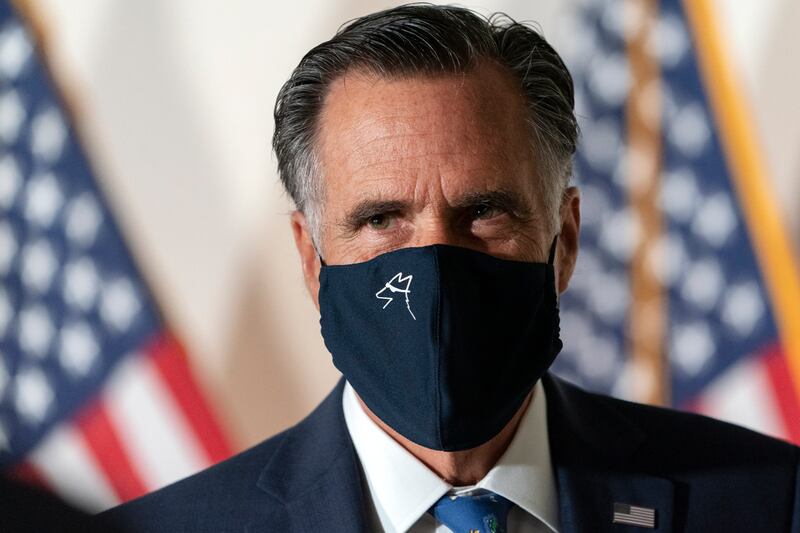SALT LAKE CITY — Utah Sen. Mitt Romney leaned on the law and historical precedent in deciding to vote on an election year replacement for liberal Justice Ruth Bader Ginsburg should a nominee reach the Senate floor.
But he also wants to see the U.S. Supreme Court chart a more conservative course in the future, a probable outcome with whoever President Donald Trump picks to fill the vacancy.
“I do recognize that a lot of angst and energy surrounding the current nomination process is related to the fact the liberals have enjoyed a liberal-leaning court for decades, and are very upset about the prospect that the court may take a more conservative tack,” he said Tuesday in a conference call with Utah reporters.
“I understand that, but I don’t concur with it. I’m a conservative and hope that we do have a court that holds to the law and the Constitution rather than a different course.”
Romney said his decision regarding a Supreme Court nomination is not the result of a subjective test of fairness which, like beauty, is in the eye of the beholder. He said it is based on the immutable fairness of following the law, which in this case is the Constitution and precedent.
“The historical precedent of election year nominations is that the Senate generally does not confirm an opposing party’s nominee but does confirm a nominee of its own,” he said in a statement Tuesday.
The Constitution gives the president the power to nominate and the Senate the authority to provide advice and consent on Supreme Court nominees, Romney said.
“Accordingly, I intend to follow the Constitution and precedent in considering the president’s nominee,” he said. “If the nominee reaches the Senate floor, I intend to vote based upon their qualifications.”
Trump said he intends to nominate a woman to replace Ginsburg, who died last Friday, by the end of the week.
Romney singled out the Roe v. Wade decision “to find a right not enumerated in the Constitution” as one he has struggled with under what he described as a liberal court. He said he would have preferred states make abortion law rather than unelected justices. He supports a future Supreme Court overturning the 1973 ruling and returning the decision to states.
Romney’s support for moving ahead with a nominee ended speculation that he would join Republican Sens. Susan Collins, of Maine, and Lisa Murkowski, of Alaska, in opposing a vote until after the presidential election. It also likely gives Senate Majority Leader Mitch McConnell, R-Ky., the 50 GOP senators he needs to hold a vote. Republicans own a 53-47 edge in the Senate.
Romney said he did not talk to Collins or Murkowski, but respects their position.
“I don’t know what other senators will do,” he said. “I don’t know whether there will be three or four that would be sufficient to block consideration of a new nominee.”
Democrats have decried McConnell’s decision as hypocritical because he blocked a vote on President Barack Obama’s choice to replace the late Justice Antonin Scalia during the 2016 presidential election.
Romney said the Garland decision was consistent with precedent and history. The Senate in some cases has confirmed or rejected a Supreme Court nominee from the opposition party in an election year.
“Whether or not that is a decision you agree with is a different matter. I wasn’t there and will not provide an opinion about whether it was a good decision or bad one but certainly it was consistent with precedent,” he said.
Sen. Mike Lee, R-Utah, who opposed moving forward on Obama’s nomination of Merrick Garland in 2016, said he supports voting on a Trump nominee.
Obama nominated a replacement for Scalia and the Senate gave its advice and consent on the nominee, consistent with the Constitution, by rejecting him, Lee said. He said he and his Senate colleagues would follow the same process with Trump’s nominee.
“If we like the nominee, we will confirm her. If we don’t, we won’t. It’s that simple,” Lee said.
Romney declined to say whether he would vote on a Trump nominee during what would be a lame duck period should the president not be reelected. He said his decision applies to the current situation.
“I’m just not going to go there,” he said.
Romney said he heard from friends, donors and family members as he considered his decision. He also talked with former House Speaker Paul Ryan, his running mate in the 2012 presidential election, as well as other Republicans and Democrats, though not Senate Minority Leader Chuck Schumer. He said he informed McConnell of his decision Tuesday morning.
Calls his office received from constituents were evenly divided between voting and not voting on a nominee, he said.
Romney noted that some Republicans were not happy with his impeachment vote and some Democrats aren’t happy that he intends to vote for a new Supreme Court nominee.
But I try to do what I believe is right and within the law and consistent with my oath of office or with my oath as a juror,” he said. “That’s how I can live with these difficult decisions.”


 alt=Dennis Romboy
alt=Dennis Romboy